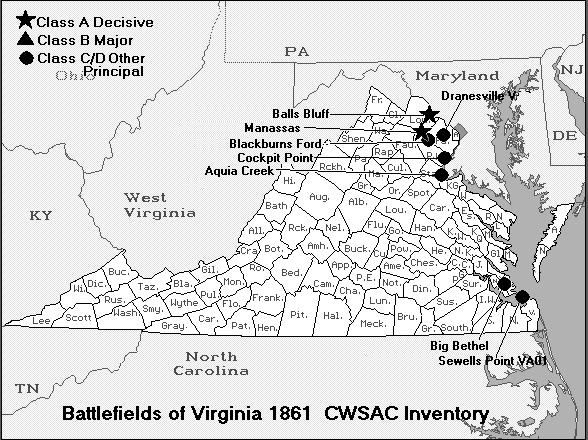|
Civil War Battle of Big Bethel Church, Virginia
| Battle of Big Bethel Map |

|
| Civil War Big Bethel Battlefield Map |
BIG BETHEL CHURCH, VA : A CIVIL WAR BATTLE
JUNE 10TH, 1861
Big
Bethel, Va., June 10, 1861. 1st, 2nd, 3rd, 5th and
7th New York, 1st Vermont, and 4th Massachusetts Infantry, and
2nd
United States Artillery. About 8 miles from Newport News
were two churches known as Big and Little Bethel. At the
former
there was a considerable force of Confederates, under
Col. J. B. Magruder, and works of more or less strength were
in
process of construction, while at the latter there was a
Confederate outpost, from which a squad of cavalry was nightly
sent out to annoy the Federal pickets, impress Union men into
the Confederate army, carry away slaves who had been
left in
charge of farms, and, take them to Yorktown and Williamsburg
to work on the fortifications. Gen. B. F. Butler,
therefore,
determined to destroy the outpost and drive the enemy from his
position at Big Bethel. An expedition, under
the command of
Brig.-Gen. E. W. Pierce, was planned on the evening of the 9th
and at 1 o'clock on the morning of the
1Oth the 7th N.Y.
(Duryea's zouaves) was ferried across the creek and ordered to
march to New Market bridge in the
enemy's rear. At 2 o'clock
the 3rd N.Y. under Col. Townsend, and the 7th N.Y., with the
Massachusetts and Vermont
troops under Col. Bendix, marched by
different roads, intending to effect a junction at the forks
of the road about
a mile and a half from Little Bethel, the
purpose being to attack that place at daybreak. Bendix
reached the rendezvous
first and his men, mistaking Townsend's
force, as it approached in the dim light of the early dawn,
for Confederates,
fired upon them, killing 2 and wounding 21.
The sound of the firing made it impossible to surprise the
enemy and some
of the officers favored a return to Camp
Hamilton, but Pierce, knowing that reinforcements were coming
to his assistance,
pushed on to find Little Bethel deserted.
The church was burned, the artillery, under Lieut. Greble, was
brought to
the front and the whole column advanced on Big
Bethel. By a peculiar coincidence Col. Magruder had planned
an attack
on Camp Hamilton for that morning, had aroused his
men at 3 a.m., and when the first firing was heard was three
and
a half miles from his works. He returned to his position
at Big Bethel and disposed his forces to resist any assault
likely
to be made. When Pierce came up about 9 o'clock he
found the ford on the Hampton road guarded by two companies of
North
Carolina sharpshooters, while on the opposite side of
the road, protected by earthworks, were Stuart's cavalry and
the
3rd Va. infantry with a howitzer commanding the road.
Beyond the creek were two more howitzers, well supported,
trained
on the ford. After some skirmishing, Pierce, seeing
the strength of the Confederate position, withdrew his forces
with
a loss of 18 killed, 53 wounded and 5 missing. Among the
killed were Maj. Theodore Winthrop, of Butler's staff, and
Lieut.
John T. Greble, commanding the artillery.
Source: The Union Army, vol. 5
Advance to:
Recommended Reading: More Terrible than Victory:
North Carolina's
Bloody Bethel Regiment, 1861-65
(368 Pages). Description: Craig Chapman presents
the definitive history of the First North Carolina Volunteers / 11th Regiment North Carolina Troops--the legendary Bethel
Regiment. The 1st North Carolina Volunteers struck history as it engaged in the Civil War's first land battle and witnessed
the first soldier killed in the great conflict. Chapman conveys the compelling history of these brave men as they left hearth
and home in defense of their state, beliefs and ideals. Most of the unit's raw, young recruits had never traveled
outside of North Carolina, nor fired a weapon in combat.
Continued below...
"That all changed, and it dramatically changed their lives forever..." After
an enlistment of six months, North Carolina's First Regiment disbanded. Most of the men then enlisted in the Eleventh
NC Regiment, commonly referred to as the Bloody Bethel Regiment, and fought
in the bloodiest battles and campaigns of the Civil War. About the Author: Craig
S. Chapman commands one of the North Carolina National Guard infantry battalions that traces its lineage to the Eleventh Regiment
North Carolina Troops, the unit that started out as the First North Carolina Volunteers and nicknamed the Bethel Regiment.
Chapman resides in Raleigh, North Carolina.
|

